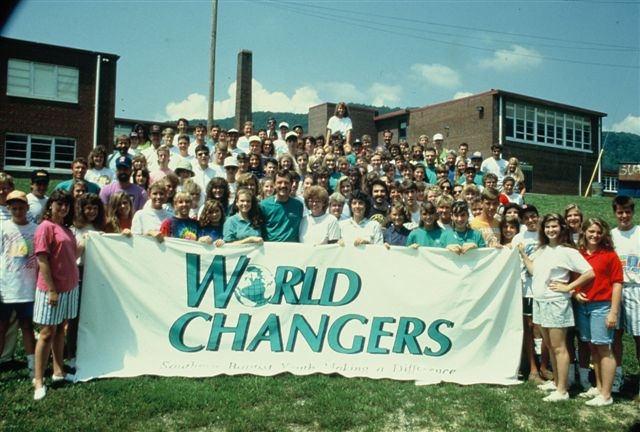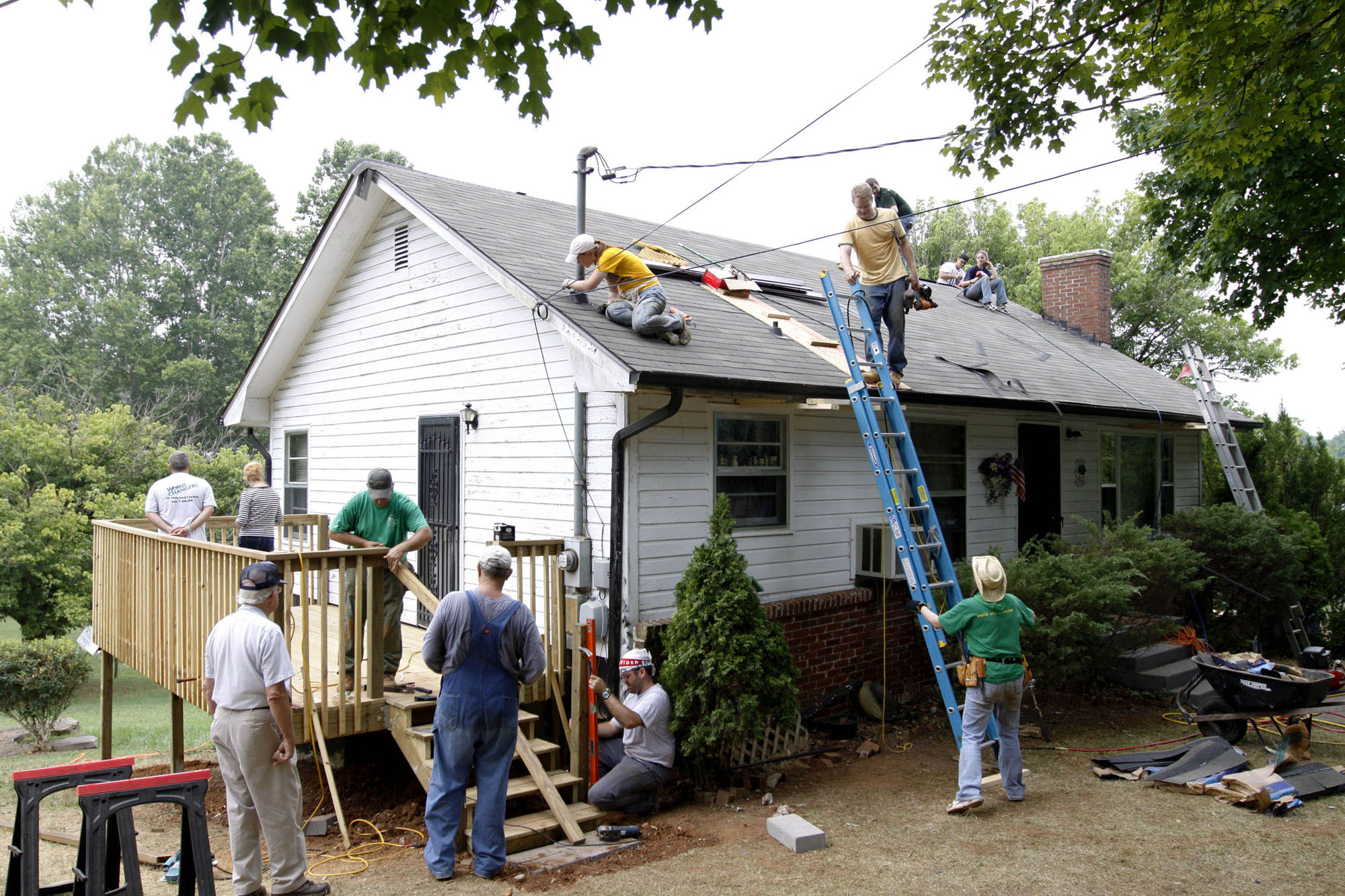
NASHVILLE (BP) — Thirty years ago this summer, a group of 137 youth and adults spent a week in Appalachian coal country doing construction work on nine homes and sharing the Gospel in the neighborhoods where they worked.
 That pilot project in the East Tennessee community of Briceville marked the beginning of World Changers.
That pilot project in the East Tennessee community of Briceville marked the beginning of World Changers.
The May 1 announcement from LifeWay Christian Resources that World Changers would be discontinued came as something of a personal loss to the staff, students and leaders that participated in the program’s projects over the years.
Over the last three decades, World Changers developed a following of passionate, loyal supporters. Its blend of hard work and up-close-and-personal ministry aptly illustrated the Great Commission for a new generation.
Along with the youth group he led at First Baptist Church of Memphis, Andy Morris participated in the pilot project in 1990. When the Southern Baptist Brotherhood Commission established the World Changers program after the success of the pilot project, Morris became the first director.
“Developing and managing World Changers was one of the best experiences of my life,” Morris said. “Watching God at work through the work of countless volunteers, national staff, students, coordinators, worship leaders, speakers, crew chiefs, summer staff, residents and agency representatives was a sight to behold.
“We all felt like we were involved in a work that was bigger than ourselves and that God was using the experience to change lives. It has been one of the best blessings of my life.”
 Morris and Tim Yarbrough, World Changers’ first program editor, traveled the country coast to coast in 1991 during the program’s first full year.
Morris and Tim Yarbrough, World Changers’ first program editor, traveled the country coast to coast in 1991 during the program’s first full year.
“It was a good thing that we were young and didn’t know any better,” Yarbrough said. “It was nothing short of a miracle that the first six projects — which included those in Los Angeles and the Eastern Shore of Virginia — were pulled off and with such success. I had a front-row seat to watch how God used World Changers mightily to engage and deploy students and leaders for missions in ways previously unimaginable in Southern Baptist life.”
In 1992 the number of projects doubled to 12, and summer staff teams were deployed to facilitate the exploding popularity of the program.
World Changers partnered with government agencies across the country to provide free labor to improve homes in mostly low-income neighborhoods. Many municipalities formed lasting relationships with the ministry’s leaders and relied on World Changers as a way to stretch their budgets by cutting many of the costs associated with improving local homes.
For volunteers, World Changers offered a unique missions experience that blended physically demanding construction work — including roofing, scraping and painting and building wheelchair ramps — with real-world, relational evangelism.
When the Brotherhood Commission merged with the Home Mission Board and other Southern Baptist agencies to form the North American Mission Board (NAMB) in 1997, NAMB assumed operations of World Changers. In 2011, LifeWay formed a partnership with NAMB and took over operations.
John Bailey worked with World Changers for more than 15 years. He is the former director of student volunteer mobilization at NAMB and manager of World Changers at LifeWay. He said one of the most valuable byproducts of World Changers’ model of ministry was its celebration of often uncomfortable, but eternally important, interactions among volunteers and those they served.
“Missions is about people but not just people like us,” said Bailey, who is currently associate executive director of the Highland Lakes Camp and Conference Center in Spicewood, Texas. “What made … World Changers so special to me was all the different people who came together — different economic backgrounds, different educational backgrounds, different generations, different ethnic groups, different skills and so on. I am certain I will not see that diversity again until I get to heaven.”
Many World Changers alums would likely agree that the hard work and cross-cultural evangelism of World Changers affected the staff and volunteers as much as it did the members of the communities they served.
“The construction aspect of World Changers gave the ability to see a finished product at the end of the week and to marvel at how God used them to accomplish this seemingly impossible task,” Morris said. “This created a whole generation of students that were used to ‘getting their hands dirty’ with construction projects.”
Before World Changers, many churches saw short-term mission projects as a training exercise. Such projects also required a lot of legwork by churches and associations. World Changers was a “new approach to missions,” according to Bailey.
“Many churches would go for a mission week to learn about missions and then be expected to go back home and do missions,” he said. “Those Brotherhood [Commission] leaders came up with the idea of flipping the model. Instead of going to learn about missions and then doing missions at home, they decided to learn about missions at home and then go and do a week of missions together.”
World Changers was a trailblazer in the concept of pre-packaged missions experiences for churches.
Jonathan Wilson’s first experience with World Changers came in 1996, when he served on its summer staff. Summer staff members were often college students who would travel across the country working with local coordinators to host participants for various projects.
At the first worksite Wilson visited that summer in Frankfort, Ill., two middle school girls from Bellevue Baptist Church in Memphis, ran up to the truck as he pulled in, saying, “Jonathan, Jonathan you won’t believe what just happened!”
Wilson assumed that one of the girls had met a boy from the neighborhood where their team had been working and that they had exchanged phone numbers — but what he heard next changed his life.
“They proceeded to tell me how they had just led the resident of that home to the Lord,” said Wilson. “Jerry had come home a few days earlier after quadruple bypass heart surgery and these girls were able to share the Good News of Jesus Christ with him.
“I knew at that point this was a ministry that I wanted to be a part of long term.”
He later served as strategy development coordinator for World Changers at NAMB from 2002-2011. Wilson said World Changers provided churches the opportunity to immerse their students in situations where they could meet real physical and spiritual needs — leading many to develop a lifelong passion for missions.
“World Changers offered student pastors and youth leaders of churches large and small an opportunity to put their students in positions where they could see that God could use them now to make a difference,” said Wilson, who is currently family and missions pastor for Fruit Cove Baptist Church in St. Johns, Fla. “I know so many people in ministry who were introduced to, and developed a heart for, missions at a World Changers project.”
As Bailey put it: “World Changers set the missions DNA of a generation.”
While Morris regrets that World Changers is ceasing operations, he emphasized that the work of World Changers will continue through the efforts of multiple faith-based non-profits with historic connections to the ministry. Mission Serve in Georgia, Metro Changers in Alabama, Kentucky Changers in Kentucky, and Bounce in Texas are organizations with deep connections to World Changers. Each continues to utilize the rehabilitation of sub-standard housing as a vehicle for sharing the Gospel.
Morris founded Mission Serve in 2003. Since then the ministry has mobilized more than 50,000 volunteers using World Changers’ original ministry model.
“Mission Serve hopes to fill the void that World Changers has left and spread this wonderful experience of students and adults working to eliminate sub-standard housing through roofing, painting, other low-income homeowner repairs,” said Morris, who continues in a part-time role as Serve 365 director for Mission Serve.
In World Changers’ wake, Morris said that Mission Serve aims to inform churches and individuals who have traditionally been involved with World Changers that they, and other ministries, are keeping the spirit of World Changers’ model alive — and that churches are welcome to play a part in doing it, too.
A closing celebration for World Changers will be held July 24-26 at Northwood Hills Baptist Church in Northport, Ala. All former staff, summer staff and coordinators are invited to attend. For more information on the event, call (205) 339-3196.
















